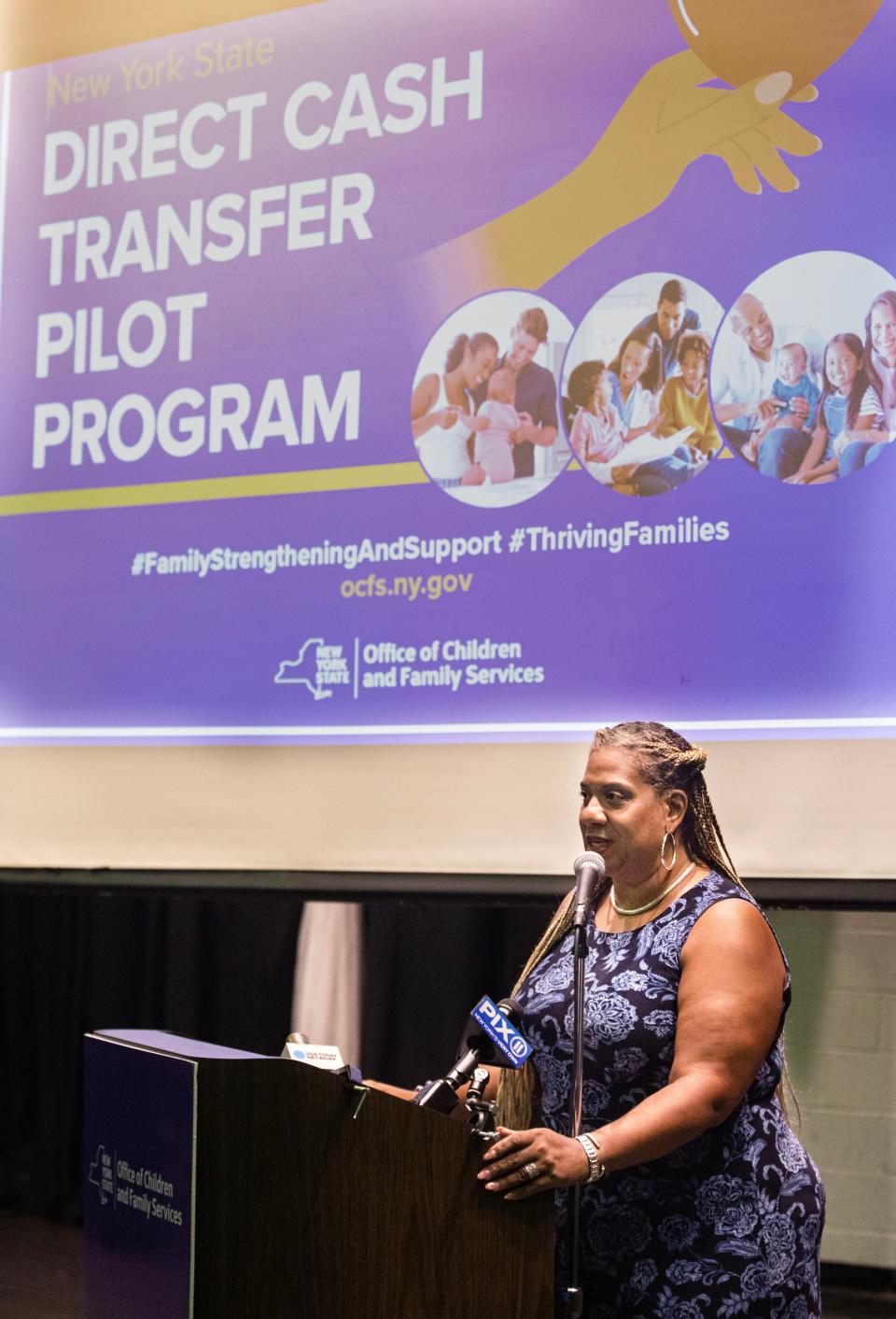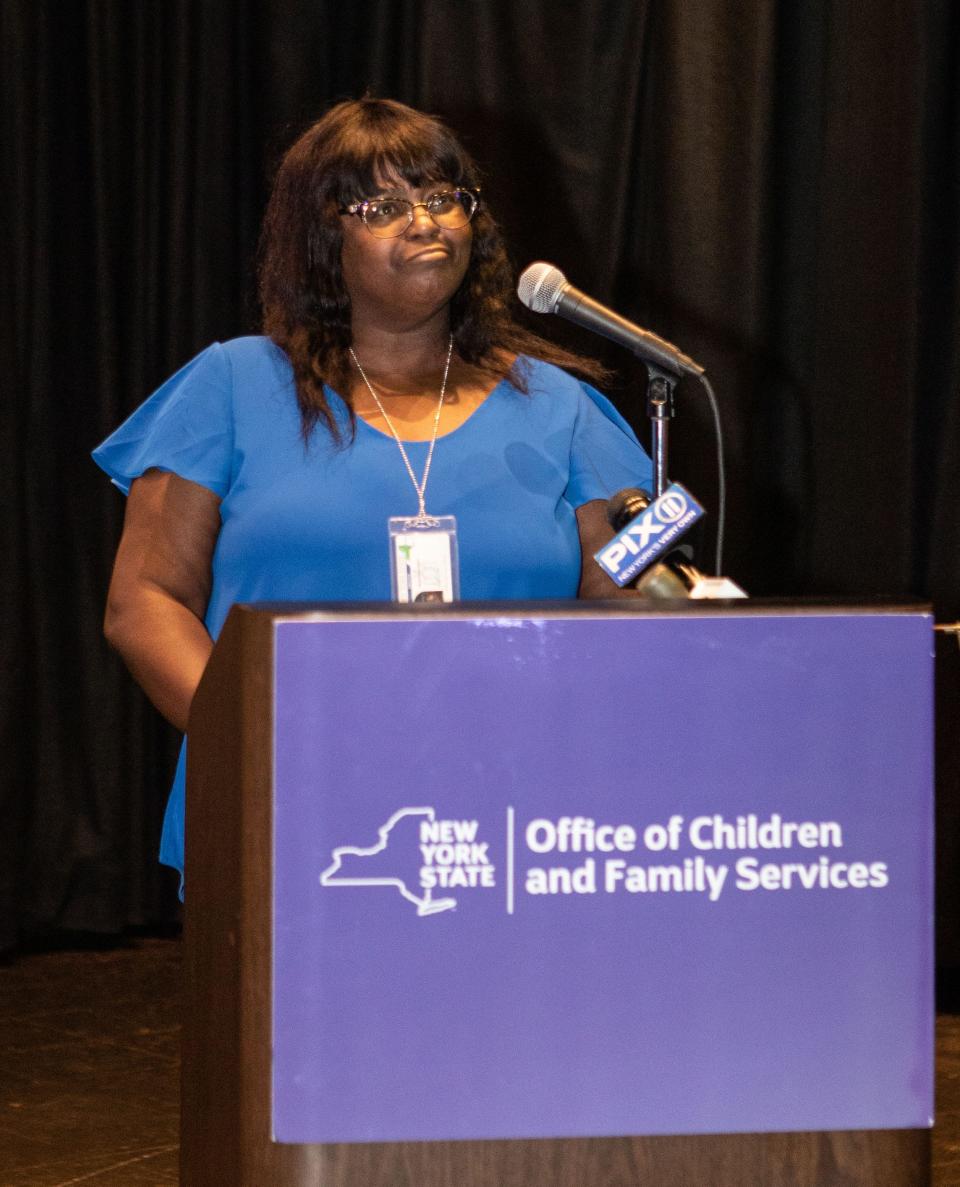NY to study if $500 extra a month can keep at-risk families out of child-welfare system
MOUNT VERNON — State officials were in town, unveiling a first-of-its-kind study to see if small monthly cash payments could keep at-risk families from run-ins with the child-welfare system. It got Mayor Shawyn Patterson-Howard thinking — about envelopes from Manufacturers Hanover.
When she was growing up, every other Friday was payday for her mother, Sharon. She’d cash her paycheck at Manufacturers Hanover bank and come home with an envelope. Then the single mother would sit at the table, open the envelope and stack her pay into piles.
“This was for rent, this was for food, this was for clothing, this was for leisure, this was for medical,” Patterson-Howard recalled.
Then her mother would look at the piles of money, the product of two weeks of work, and begin a sort of juggling act. She'd move money from stack to stack, making one shorter and another taller.
“She just had to figure out, ‘OK, if I don’t pay the light bill this month, I can make sure the rent is paid. If I don’t pay the rent this month, then ConEd is covered,’” said Patterson-Howard. Her mother had support from her larger family, but many parents do not. Despite living in one of the nation's wealthiest counties, many in Westchester run out of money long before they run out of month. That uncertainty ratchets up household tensions, she said.
"We have to stop families from living like that," the mayor said at the Doles Recreation Center, where the news conference was held. "It really tears down their mental and their emotional strength. It causes them to make decisions that puts their housing, their food, their lights, their utilities at risk. And it puts the children at risk of being reported" to child welfare services for cases of suspected neglect.
Do you struggle with making ends meet in Westchester County or the Hudson Valley region? We're reporting on affordability, and we'd love to hear from you. Fill out this online form to give us your story.

Can direct cash payments be the difference for at-risk families?
That is why Patterson-Howard has joined a nationwide group called Mayors for a Guaranteed Income, and why she used federal American Rescue Plan funds to create a city program called Level Up, whereby 200 city families receive $500 a month for a year to help keep their heads above water. And why she was at the Doles Center on what was supposed to be her day off, to hear representatives from the state's Office for Children and Family Services launch the Direct Cash Transfer Pilot program.
For 18 months, the pilot study will track 450 at-risk families in Monroe, Onondaga and Westchester counties and chart their emotional, physical and financial well-being. In each county, 50 families will receive a stipend to boost their bottom line — $500 a month, $6,000 for a year — and will be asked to fill out a questionnaire every six months. Another 100 families will be the control group, paid $75 for filling out the same questionnaire but without the stipend.
The study's goal is to gauge if a relatively small investment in at-risk families could provide enough of a cushion to keep them from being referred to child welfare services. More money helps the family's bottom line, of course, but organizers said this pilot program is the first to study if guaranteed income with no strings attached will forestall future interactions with the costly child welfare system.
Frank Edwards, a criminology professor at Rutgers University, is one of the lead researchers.
"Poverty comes with all kinds of shocks, all kinds of instability and uncertainty and stress," Edwards said. "We want to examine how these kinds of programs could smooth out those kinds of routine crises, routine stressors for families and kids."
The poverty numbers are stark, Edwards said, and the involvement of child protective services is real.
One in seven children in the U.S. is poor.
One in 20 children get investigated by child protective services annually.
About one in two black children are investigated by CPS by the time they turn 18.
About one in three indigenous children are investigated by CPS before they turn 18.

'Guaranteed income' idea gains traction
The idea of guaranteed income, a sort of floor for the social safety net offering no-strings-attached temporary cash payments to low-income residents, has gained traction in recent years, and not just with the mayors group and in academia.
Leaders in Los Angeles County, Chicago's Cook County, Houston's Harris County and elsewhere have formed a similar group, Counties for Guaranteed Income, to research the issue and advocate for it.
Critics contend the programs remove an incentive to work, or are too expensive, but Edwards sees it otherwise.
He said when a family in the grip of poverty is referred to CPS for suspected neglect, it's too often seen as a personal failure when it's really a policy failure. His study and others across the country are designed to put data to the problem, to create a foundation for evidence-based solutions.
Families will be able to decide how to use the money for their needs
Gail Geohagen-Pratt, acting deputy commissioner for the state Office of Children and Family Services, said the pilot flips the script on how money is allocated. Federal SNAP food benefits come with all sorts of restrictions. The pilot's funds come with a level of trust that is empowering, on purpose.
"We wanted folks who receive this additional stipend to know: 'It's yours to determine how this best will meet whatever the needs are for your family. And no one else has a voice in telling you how you can use it,'" Geohagan-Pratt said. "Systemically, there is a distrust in terms of families making the right decisions about how they spend that money. We wanted to say, 'No, we absolutely believe families are able to make the decisions best suited for their needs."
Patterson-Howard puts a finer point on it.
"We've paid landlords for a long time and given them direct payments and we've bailed out big business and corporations, but we've always frowned at giving direct cash to those who need it most, who will spend it in their local communities," she said.
This money will generate sales tax revenue and raise up small businesses while meeting a yawning need.
"Need" is the key word, says Geohagen-Pratt.
"When you think about rent, food, clothing, childcare, transportation, these are such basic needs that speak to well-being and sustainability. These aren't wants. These are actual needs. When you find yourself in a situation where you actually have to decide 'Which need am I going to be able to afford?' Really?"

Direct payments eased pandemic's impact
These are not the first direct payments given in recent years. During the pandemic, there were three rounds of direct payments and tax credits to keep families afloat.
In March 2020, the Coronavirus Aid, Relief, and Economic Security Act (CARES Act) gave eligible adults up to $1,200, while children younger than 17 got $500. Families of four, then, could see direct payments of $3,400.
The Tax Relief Act of 2020 gave more direct payments: up to $600 per adult and the same for children younger than 17.
In 2021, the American Rescue Plan gave another round of direct payments, up to $1,400 for eligible individuals or $2,800 for married couples filing jointly, plus $1,400 for each qualifying dependent, including adult dependents.
The federal Small Business Administration also handed out nearly $785 billion in Paycheck Protection Program loans between March 2020 and May 2021. As of October 2022, it had forgiven $755 billion worth of those loans.
How the pilot program works
Here's how the Direct Cash Transfer pilot will work.
For the next year, 150 families — 50 each in Monroe, Onondaga and Westchester counties — will get $500 per month on debit cards, a total of $6,000 each.
Every six months for the next 18 months, they'll fill out identical questionnaires about their family's mental, physical and financial well-being. They began the study by filling out the same questionnaire, giving investigators a benchmark.
Another 300 families — a hundred in each of the same counties — will be considered the study's control group, filling out the same questionnaires, for which they'll be paid $75 each time.
The families' interactions with child-welfare agencies will also be charted. Edwards said a family's interaction with child welfare during the study won't remove them from the program, but if children are removed from the home, that would run afoul of the pilot's guidelines.
How it was funded
The monthly stipends will total $900,000 and the operating costs for the program (including the control-group payments) will total $655,379. Funding came from federal, state and private sources, including:
Federal Family First Transition Act Fund: $870,000 toward the monthly stipend.
Redlich Horwitz Foundation: $30,000 toward the monthly stipend. The addition of private funds, organizers said, permits participants to get a waiver from SNAP income limits.
State Quality Enhancement Fund: $75,000 to support a "hold harmless fund" for if a plan participant loses benefits because they breached a threshold for other programs.
How the families were chosen
The study is being run by the Center for Guaranteed Income Research at the University of Pennsylvania, a research center that has focused on the impact of cash transfers. The day-to-day operation of the study will be handled by Youth Research Incorporated, whose executive director is Cassie Pustilnik.
Pustilnik said the pool of pilot participants was drawn from families who had had interactions with the OCFS in recent months, but whose cases did not involve safety concerns for the children or their families. These families were designated for what is called a Family Assessment Response, an alternative approach to an investigation that focuses more on finding support solutions for families.
It turns out that Monroe, Onondaga and Westchester, the three counties chosen for the pilot study, have a high number of FAR cases, a larger pool of potential participants.
Pustilnik said recent FAR families were invited to apply for the pilot. From that group, 50 participants and 100 control-group families were chosen at random in each county. Pustilnik did not have a breakdown of where the Westchester families were located.
Westchester was first to hold an event to launch the pilot, which is already up and running in all three counties. A similar event will be held in Monroe County on Aug. 9. There will be no event in Onondaga County.
Why Westchester?
Leonard Townes, Westchester's social services commissioner, said the county, for all its Fortune 500 headquarters and exclusive communities, has its share of want.
"Here in Westchester County, poverty exists, too, and sometimes these people are marginalized and not seen because of the wealth of the community," Townes said. "When you think about the cost of living here, for someone who doesn't have much money, that can put immense pressure on families and cause problems within the family dynamic."
Kerry Whalen-Megley is executive director of Family Ties of Westchester, a family advocate organization with centers in White Plains, Mount Vernon, Ossining, Yonkers and Peekskill.
"Despite being identified as one of the most prosperous counties in the entire country, fully 40% of our neighbors are living paycheck to paycheck and struggle with economic hardship," Whalen-Megley said. "That's why the state's focus on family well-being and research projects like this are so important."
Whalen-Megley said her case workers hear daily from families who struggle with making ends meet and face the same kind of choices Mayor Patterson-Howard's mother faced all those years ago.
"The toxic stress from these accumulated experiences ripples outwards unleashing negative consequences that impact family members and communities across generations" and "increase a family's chance of coming to the attention of the child-welfare system," she said.
$6,000 now or $60,000 later
The pilot study is funded, in part, by the Redlich Horwitz Foundation, whose website said the organization "aspires to see families thrive and live free from surveillance and policing by the child welfare system."
Sarah Chiles, Redlich Horwitz's executive director, said: “We believe keeping families together is paramount, but too often, poverty drives families into the child welfare system."
Chiles said intervention with guaranteed income before a family reaches the social services system can be a win-win.
"These services can sometimes cost as much as $60,000 per family if a child is removed into foster care," she said. "So it's $6,000 versus $60,000 for taxpayers in terms of savings, that's ten times the cost of serving a family in this program."
There is another cost to consider, Chiles said, in terms of mental health.
"We know that children separated from their families by foster care experience significantly deep emotional harm and trauma and that further burdens and stresses our mental health care system," she said. Chiles said her foundation hopes to move quickly to secure federal funding for direct cash assistance as a child welfare strategy.
Forced to tell 'their poverty story'
Patterson-Howard, a social worker by training, said direct cash payments hold the potential of breaking a vicious cycle while retaining the dignity of recipients.
"Oftentimes we force families, when they need help, to continuously tell their poverty story over and over again. 'I'm struggling. I can't pay for after school. I'm struggling with my housing. I'm struggling with food. I don't have proper transportation. I have to work overtime, which oftentimes puts my children at risk because they have to stay home,'" she said.
"But at the same time, if they didn't work overtime and sometimes leave children at home, then they would be kicked out of housing and land in shelters and their children would still be at risk for sometimes being taken."
We want to hear from you
It's expensive here. Have you taken on extra jobs? Moved in with family? Sought help from a food pantry or religious group? Cut back on entertainment or other expenses?
We're looking at the affordability (or unaffordability) of the northern suburbs. We’d love to hear your affordability story and share it with readers. Fill out the form below and your submission will go straight to a USA Today Network reporter. We may reach out to you for more information about your story.
Reach Peter D. Kramer at pkramer@gannett.com.
This article originally appeared on Rockland/Westchester Journal News: NY to study if $500 to at-risk families will stem child-welfare calls

